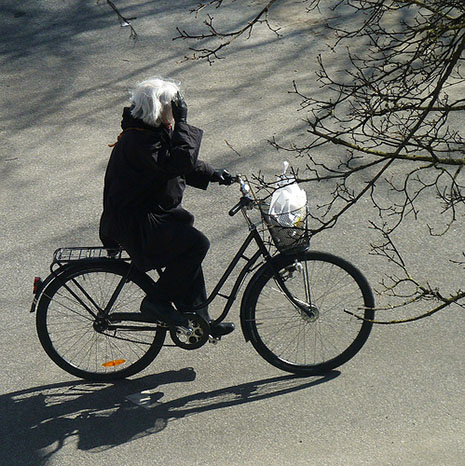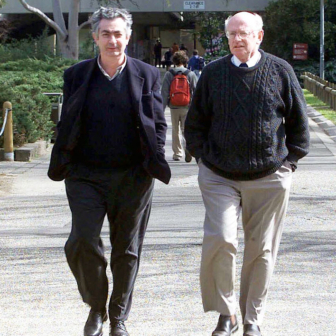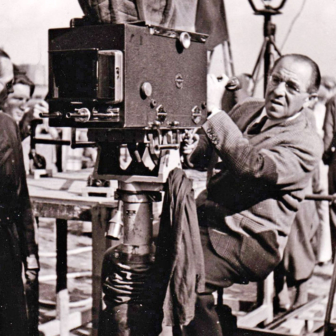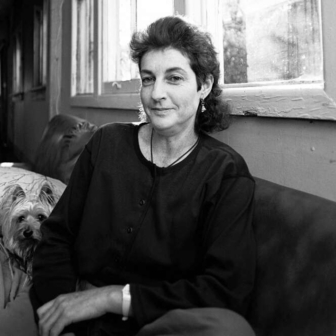In Praise of Ageing
By Patricia Edgar | Text Publishing | $32.99
Out of Time: The Pleasures and the Perils of Ageing
By Lynne Segal | Verso | $39.95
Ammonites and Leaping Fish: A Life in Time
By Penelope Lively | Penguin | $35
A FEW days ago I turned seventy-five but, truth be told, I’ve been pondering the three-quarter-century mark ever since I reached seventy-four. Why it’s a milestone is hard to say, as it is with any kind of milestone. Officially, I became old on my sixtieth birthday, fifteen years ago. That’s when I got the treasured seniors card that enables me to travel on public transport at mercifully reasonable rates, although recent changes in the age pension mean that I wouldn’t now be eligible for it until I’d lived another year and a bit. Later, had I had superannuation, I would have been able to access my annuity tax-free, but I didn’t and, as a working senior, I still contribute to consolidated revenue in the form of income taxes. On the face of it, Commonwealth treasurers since Peter Costello must love me, but that isn’t so.
From the point of view of any treasurer, seniors like me pose a problem. We are living too long and there are too many of us. What’s more, our numbers are ballooning. For decades we were warned that when the baby-boomer cohort reached retirement age there would be too few taxpayers to support the drain on our pension and health systems. In response to this dire scenario, the Hawke–Keating government introduced compulsory superannuation. Some thirty years later, the scheme has become so sacrosanct that it’s almost impossible to argue that it has its own costs, although some fine minds such as Brian Toohey and others have been brave enough to do so. Another, less expensive response has been to raise by increments the official retirement age — the age, that is, when, all things being equal, you’re eligible to get the age pension or a part thereof. The Rudd–Gillard government’s objective was to raise this to sixty-seven, and as far as I can tell the Coalition will continue nudging it up, maybe to seventy.
Baldly put, what we see here is the profound and largely consensual impact that neoliberalism has had on growing old. If ever-lower taxes are the sine qua non of the good economy, then individuals must shoulder the bulk of the responsibility for their retirement, even if that means postponing it to an ever-rising age. This is the theory, anyway. That it has inbuilt contradictions and doesn’t quite fit the facts is another matter. The Labor government raised the age pension and tried to inject a smidgen of equity by proposing a tax on super payouts over $100,000, but Tony Abbott is reversing that. He’s also abolishing the Advisory Panel on Positive Ageing because it has “outlived” its “original purpose” and doesn’t forward Coalition objectives, whatever that means.
For all the figures and modelling supporting these policies, they are largely a consequence of our unbelievably varied but largely negative views about ageing and death. Both Patricia Edgar and Lynne Segal have made these views their subject. As Edgar’s title suggests, her aim is to counter the negativity associated with age in our resolutely secular yet market-worshipping society. Segal’s approach is similar but more expansive, drawing on the work of a range of writers grappling with the essentially paradoxical phenomenon of avoiding death only to find oneself old. Although their takes on the subject are radically different, both have written absorbing accounts of just what it means to look into the mirror and think: Wow! Who is that grey-headed/puffy-eyed/wattle-cheeked/hunchbacked/wrinkled prune of a stranger?
PATRICIA Edgar, founder and former head of the Australian Children’s Television Foundation, is a year older than I am and, formally at least, has retired. While taking issue with many of the givens about ageing that underpin government policy, Edgar places the burden of her arguments on eight “elders,” seven women and men in their eighties and nineties, and a centenarian who has since died. In Praise of Ageing is, accordingly, “about active, engaged older people who are enjoying their lives and continuing to contribute.” Edgar maintains that these elders of hers represent the true trend, not the spectre of disease and dependency that governments and policy-makers routinely hold up to us.
Let’s begin, then, with her centenarian. Muriel Crabtree was born in 1908 in Launceston. In 1925 her family moved to Melbourne so that she could take up tertiary study — unusual support for a girl in those days, for a start. She graduated in science in 1930, received a first-class master’s degree in biochemistry a year later, and then took up a graduate scholarship at the American Ivy League women’s college Bryn Mawr. She pursued a scientific career in England and on the continent and returned to Australia just before the outbreak of the second world war. Later, she was the deputy principal of Melbourne University Women’s College when Edgar was a student there. Crabtree, in short, was a high achiever, though she did face discrimination in seeking promotion in her chosen field. But the most remarkable thing about her, for Edgar’s and our purposes, was how she changed direction entirely and became an artist in later years. Then, after a fall compromised her mobility, she was confined unhappily in a nursing home where — until Edgar and others made a sufficient fuss — she wasn’t allowed to continue producing her pastels. She died, aged 102, just before an exhibition of her work was opened by the governor-general, Quentin Bryce.
Jim Brierley’s is the most amazing of Edgar’s stories by my reckoning, even though at eighty-nine he’s the youngster among her subjects, “a classic example of someone who has reinvented himself many times in his work and his private life following trauma and cultural change.” What distinguishes him for me (bearing in mind that I effectively gave up driving seven years ago) is how he continues to jump out of planes. A paratrooper in the war, he began jumping again at fifty-eight after his first wife died, and at the time of Edgar’s writing had jumped some 3200 times.
But the story I connected with most was Mary Owen’s. I knew Mary back in the 1970s at the height of my involvement in the women’s movement, when I was a Canberra femocrat and she had started up the very influential Working Women’s Centre in Melbourne. It astounded me to read that Mary was now ninety-two: first, because I couldn’t imagine any of us being that old — but, yes, some of us truly are, with others not far behind — and second, because I remembered her as a chain smoker and would never have dreamt it possible that she could reach such a grand old age. Apparently, though, she never inhaled, and in any case gave up the habit after a mini-stroke.
MARY was a friend in the flesh. The many friends Lynne Segal has reminded me of are writer friends, people I’ve never met but whose works have electrified me through the years — old companions such as Simone de Beauvoir, Germaine Greer, Joan Didion, Saul Bellow, John Berger and Julian Barnes, to pick out a few. Then there are the writers Segal has introduced me to, including May Sarton, Diana Athill and Stanley Kunitz, implanting an impossibly greedy desire in me to wolf down everything they’ve written before I succumb to either blindness or death. But these short lists give no real idea of the breadth of Segal’s reading on her mission to plumb the phenomenon of ageing.
Segal is an Australian who has lived in England for many years. Like Edgar, she’s a feminist, but of a very different stripe. For the most part, Edgar’s life has followed a relatively stable trajectory: a country childhood nurtured by a loving family firmly plugged into the local community, followed by a career and a marriage of fifty-four years. Segal, born in 1944, has been an activist, academic and author of many books, including the memoir Making Trouble: Life and Politics, which came out in 2007. Unlike Edgar, Segal has had varied relationships and partners, has lived in alternative communities and now lives alone. In contrast to Edgar’s generally positive spin, Segal is more reflective and ambivalent, and it’s not insignificant that her subtitle gives equal weight to the perils of ageing and its pleasures. But if Segal’s has been the bumpier ride, that has made her insights all the more challenging and intriguing, and her book that much denser and, it should be said, more taxing to read.
The first of Out of Time’s six chapters is devoted to the surprisingly difficult task of measuring “old age” and, indeed, of deciding what it actually means — difficult because we age at differing rates, but also because of the complex emotions that colour the process, and our equally complicated attitudes to it. The feminist critic Elaine Showalter opens the book’s introduction with these provocative words: “It’s not easy to come out as an old person, especially as an old woman.” The words “coming out” are deliberately chosen to demonstrate just how different it is from coming out gay. As hard as that is, there’s a significant and outspoken minority to welcome and support anyone who makes the avowal. Acknowledging being old, on the other hand, can be tantamount to consigning yourself to irrelevance. “Identifying yourself as old is to admit to something everyone can see, and thus is somehow more shaming, carrying more of a stigma,” writes Showalter. The real comparison, she contends, is not with coming out gay but with owning up to being fat.
But ageing is not about the body’s decline alone. Like many aspects of human life, it’s a cultural construct, accentuated now by our rapidly increasing longevity — sixty, as one ad I came across recently would have it, being the new thirty-five. While that’s a tad overstating it, Edgar’s eight elders certainly demonstrate the vigour of people in their eighties and nineties, and Segal argues that the very notions of “ageing well” or “badly” are bound up in the neoliberal ideologies of Western democracies. She, too, presents us with a sufficient number of “narratives of resistance” to refute this pernicious dichotomy, and it’s here that we find her approach and Edgar’s most closely aligned.
But Segal’s examination goes beyond demographics and heroics, dipping into art, culture and, occasionally, the treasures of the psyche. Her interest in psychoanalysis is prompted by a recognition of the unconscious’s ageless self. In our dreams, we are usually young, averaging around thirty-five, but it’s only recently that psychoanalysts have begun to seriously investigate this phenomenon. Freud himself found old age abhorrent, leaving us to speculate that this might have been the source of his lack of interest. In “The Uncanny,” an essay published in 1919, he related the repulsiveness of old people to their intimation of mortality and to atavistic fears of visitations from the dead.
In her chapter on intergenerational warfare Segal throws a cloak of political culture on the issue, writing of the deep antagonism of women towards their mothers that characterised the women’s movement in the sixties, seventies and eighties. But her most illuminating findings, from my point of view, concern the workings of memory, the assertion that, far from losing it, as is generally believed, the ageing mind is “dense” with it, with past and present interleaved in a kind of palimpsest — “layers,” not “litter,” as she quotes from the poet Stanley Kunitz.
FOR all the forensic investigations of the subject — scientific, economic, or popular — the wisdom, for my money, comes from writers and poets. And what a magnificent bunch Segal has brought together. Many, Philip Roth most famously perhaps, rail against age’s indignities, though Segal suspects that resistance to its ravages is more likely to be felt by redundant males than by women who’ve been conditioned since childhood to accommodate themselves to whatever circumstance they find themselves in. Still, there are enough of both sexes who exhibit a kindly sensitivity to the passing of time to earn Segal’s special praise. Julian Barnes is one, as is Stanley Kunitz. Another is Penelope Lively.
Lively’s enchanting Ammonites and Leaping Fish is not exactly a memoir, but one woman’s penetrating backward glance on a long and satisfying life. “The view from old age,” is how this accomplished author puts it. She has confined herself to five topics — old age itself, the historical dimension of her life and times, the mystery of memory, the pivotal place of reading and writing in her life, and six objects she has carried with her through the years because of their significance for her. Each of these is explored in an essay informed by the idiosyncratic mix of ease and formality that’s a hallmark of Lively’s writing.
Everything that’s been examined by Edgar and Segal is here, condensed yet somehow extended by Lively’s wit and sagacity. She is eighty years old, has had her fair share of health problems — including macular degeneration, the abiding fear of all ageing writers — but her words are as crisp and full of magic as newly fallen snow. Throughout history (that underrated yet hotly contentious discipline Lively read at Oxford and remains devoted to) there have never been so many old people. “We are the pioneers,” writes Lively, “an established group gobbling up benefits and giving grief to government agencies.”
So, what to do? It seems to me — even more after reading and reading around these three remarkable books — that the aged are a problem only when we’re poor, and societies allowed to become ever more unequal will be burdened, one way or another, with the impecunious elderly. Compulsory superannuation was meant to change this, but as it’s panned out it’s been so only for a relative few, and the charge on our revenue must continue to be enormous unless governments find the political will to rein in the concessions made to the wealthy and redistribute resources more fairly.
As for me, I always felt ageing was the perfect state for a writer, to be forever that invisible fly on the wall rather than attract the kind of attention the young inevitably clamour for (notwithstanding the need to garner just enough notice to continue in our profession). But a few weeks ago I foolishly ran for a bus, tripped, fell and, though I was lucky not to have broken any bones, I’ve been full of aches and pains ever since. Old age may not be much fun after all. But before I began to feel really sorry for myself, I received Lively’s book to review. Now, sore as I am, I’m happy to be kicking around, at least for a few more years. You never know what’s waiting in the mailbox. •




